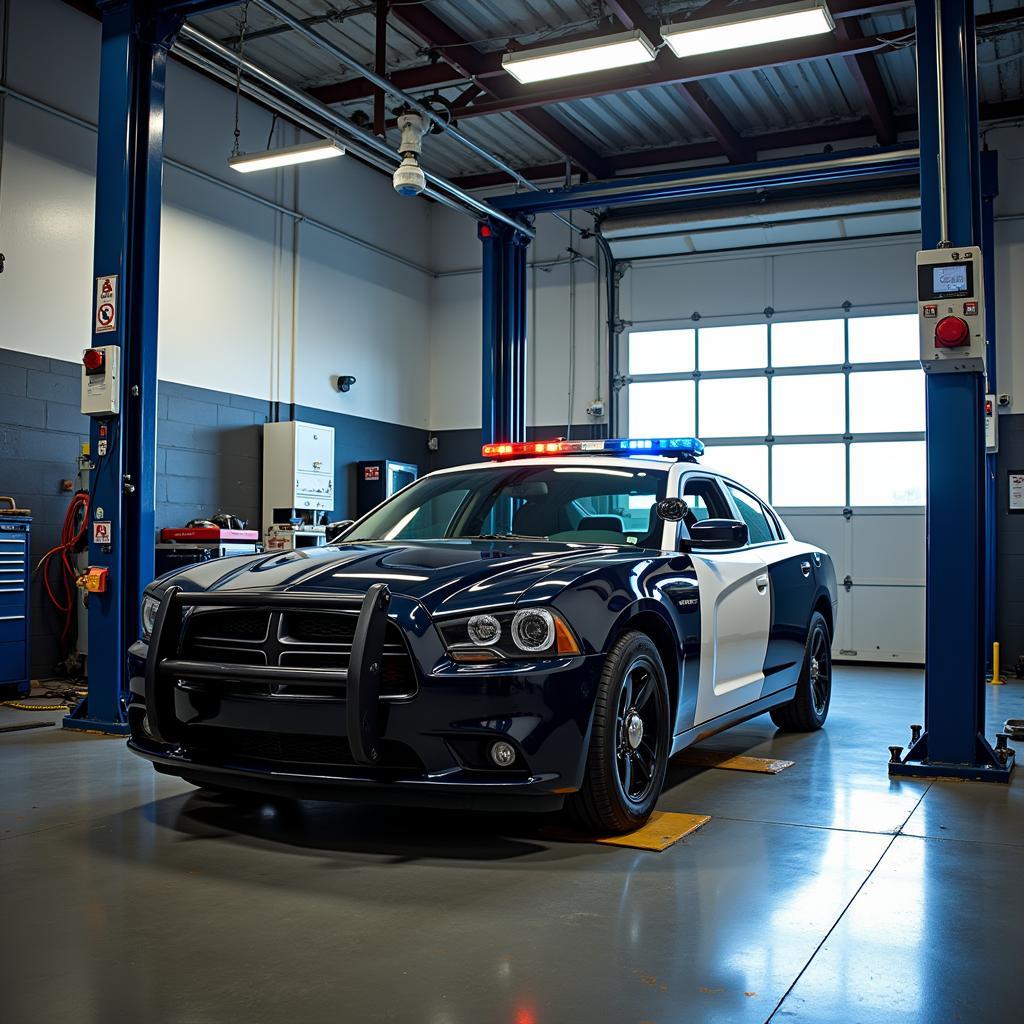How Often Are Police Cars Serviced?
Police cars are essential tools for law enforcement, demanding reliable performance under rigorous conditions. Understanding how frequently these vehicles undergo servicing is crucial for ensuring their operational readiness and officer safety. So, How Often Are Police Cars Serviced? The answer isn’t as simple as a fixed mileage interval.
Unlike personal vehicles, police car maintenance schedules are driven by usage hours rather than miles. This is due to the unique demands placed on these vehicles, such as extensive idling, rapid acceleration and deceleration, and frequent operation in challenging environments. While mileage does play a role, the focus on engine hours provides a more accurate reflection of the wear and tear experienced by police vehicles. You might be surprised to learn that some police cars can rack up significant engine hours even with relatively low mileage. This highlights the importance of a service schedule based on usage rather than distance traveled. If you’re curious about the legalities surrounding car servicing in general, you can find more information at do you legally have to get your car serviced.
The Importance of Regular Servicing for Police Vehicles
Regular servicing is paramount for ensuring the reliability and safety of police vehicles. These vehicles are subjected to significantly more stress than typical passenger cars, necessitating meticulous maintenance to prevent breakdowns and ensure peak performance. Routine checks of brakes, tires, fluids, and electrical systems are critical for maintaining operational readiness. Furthermore, regular servicing can help identify potential issues before they escalate into costly repairs or compromise officer safety. For insight into who takes care of these services, check out who services police cars.
What Factors Influence Police Car Service Intervals?
Several factors can influence how often a police car needs servicing. The type of vehicle, the severity of its use, the operating environment, and the specific department’s policies all contribute to determining the service schedule. For example, patrol cars operating in urban environments with frequent stop-and-go driving may require more frequent servicing than highway patrol vehicles. Similarly, vehicles used in extreme weather conditions may need additional maintenance to protect against the effects of heat, cold, or corrosive road salts. To understand where these vehicles are serviced, you can visit where do police cars get serviced.
Understanding Engine Hours vs. Mileage
The key difference between personal car maintenance and police car maintenance lies in the emphasis on engine hours. While personal vehicles typically follow a service schedule based on mileage, police cars prioritize engine hours due to the extended periods of idling and intense use they undergo. For instance, a patrol car might accumulate numerous engine hours while stationary at a crime scene or during traffic control, even if the mileage remains relatively low. This distinction is crucial for understanding the specific maintenance needs of law enforcement vehicles. You can learn more about the frequency of these services at how often do police cars get serviced.
Typical Police Car Service Intervals
While there’s no universal standard, many police departments follow a service schedule based on a range of 50-100 engine hours. This translates to servicing approximately every 1-2 months, depending on usage. Some departments may also incorporate mileage into their schedules, requiring servicing every 3,000-5,000 miles, whichever comes first. This approach ensures that the vehicles receive the necessary maintenance regardless of whether they accumulate high mileage or extensive engine hours.
The Role of Preventative Maintenance
Preventative maintenance plays a crucial role in extending the lifespan and reliability of police cars. This includes regular inspections, fluid changes, and component replacements based on a predetermined schedule. By proactively addressing potential issues, departments can minimize downtime, reduce repair costs, and ensure the safety of their officers. For example, regular brake inspections can prevent failures that could lead to accidents, while timely oil changes can protect the engine from excessive wear and tear. If you’re curious about contacting the police regarding a car service, you can find information on can you call the police on a car service.
Ensuring Officer Safety Through Proper Servicing
The safety of law enforcement officers is directly linked to the reliability of their vehicles. A well-maintained police car can be the difference between a successful pursuit and a dangerous situation. Regular servicing ensures that critical systems, such as brakes, steering, and communication equipment, are functioning optimally, allowing officers to perform their duties safely and effectively.
 Police Car in Service Bay
Police Car in Service Bay
Conclusion
How often are police cars serviced? The frequency is determined by engine hours, typically between 50-100 hours, or every 1-2 months. This ensures these vital vehicles remain reliable and safe for the officers who depend on them. Proper and regular maintenance is essential for maximizing the lifespan and performance of these vehicles, ultimately contributing to public safety.
FAQ
- What is the primary factor determining police car service intervals? Engine hours.
- Why are engine hours more relevant than mileage for police cars? Due to extensive idling and varying usage patterns.
- What is a typical service interval for a police car? 50-100 engine hours or 1-2 months.
- What role does preventative maintenance play? It minimizes downtime and ensures officer safety.
- How does regular servicing contribute to officer safety? By ensuring the reliability of critical vehicle systems.
- What factors can influence police car service schedules? Type of vehicle, severity of use, and operating environment.
- Why is regular servicing crucial for police vehicles? To maintain operational readiness and prevent breakdowns.
Need more car service advice? Explore related articles on our website: where do police cars get serviced, who services police cars.
For any assistance or inquiries, reach out to us via WhatsApp: +1(641)206-8880, Email: [email protected], or visit our office at 456 Oak Avenue, Miami, FL 33101, USA. Our 24/7 customer service team is ready to help.

